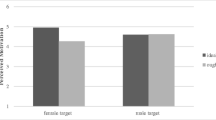Abstract
Two studies were conducted to investigate the relation between personal values and aspects of gender. Study 1 used the Rokeach Value Survey (RVS) to examine the nature of stereotypes concerning the values of the “typical man” and the “typical woman”. Results supported the hypothesis that men are viewed as more likely to endorse agentic values, such as freedom and accomplishment, whereas women are viewed as more likely to endorse communal values, such as friendship and equality. Study 2 assessed men and women's possession of stereotypic sets of masculine and feminine values, using the RVS, and examined their relation to gender-related personality traits, gender-related interests and role behaviors, and global self-perceptions of masculinity and femininity. Masculine values were found to be significantly related to socially desirable masculine traits, socially undesirable masculine traits, masculine interests and a global self-concept of masculinity. Feminine values were shown to be significantly related to socially desirable feminine traits, feminine interests, feminine role behaviors, and a global self-concept of femininity. These results suggest that gender-linked personal values merit inclusion with traits, interests, role behaviors, and global self-concepts as part of an emerging multidimensional conception of gender characteristics.
Similar content being viewed by others
References
Aubé, J., & Koestner, R. (1995). Gender characteristics and relationship adjustment: Another look at similarity-complementarity hypotheses.Journal of Personality, 63 879–904.
Aubé, J., Norcliffe, H., Craig, J-A., & Koestner, R. (1995). Gender characteristics and adjustment-related outcomes: Questioning the masculinity model.Personality and Social Psychology Bulletin, 21 284–295.
Ashmore, R. D. (1990). Sex, gender and the individual. In L. A. Pervin (Ed.),Handbook of personality: Theory and research, (pp. 486–526). NY: Guilford.
Bakan, D. (1966).The duality of human existence. Chicago: Rand McNally.
Bem, S. L. (1974). The measurement of psychological androgyny.Journal of Consulting and Clinical Psychology, 42 155–162.
Braithwait, V. A., & Scott, W. A. (1991). Values. In J. P. Robinson, P. R. Shaver & L. S. Wrightsman (Eds.),Measures of Personality and Social Psychological Attitudes. Measures of Social Psychological Attitudes Series, Vol. 1 (pp. 661–746). San Diego, CA: Academic Press.
Feather, N. T. (1984). Masculinity, femininity, psychological androgyny, and the structure of values.Journal of Personality and Social Psychology, 47 604–620.
Koestner, R., & Aubé, J. (1995). Multifactorial approaches to the study of gender.Journal of Personality, 63 681–710.
McAdams, D. P. (1995). What do we know when we know a person?Journal of Personality, in press.
O'Heron, C. A., & Orlofsky, J. L. (1990). Stereotypic and nonstereotypic sex role trait and behavior orientations, gender identity, and psychological adjustment.Journal of Personality and Social Psychology, 58 134–143.
Orlofsky, J. H., & O'Heron, C. A. (1987). Stereotypic and nonstereotypic sex role trait and behavior orientations: Implications for personal adjustment.Journal of Personality and Social Psychology, 52 1034–1042.
Raymond, B., Damino, J., & Kandel, N. (1974). Sex stereotyping in values: A comparison of three generations and two sexes.Perceptual and Motor Skills, 1974 163–166.
Rokeach, M. (1973).The Nature of Human Values. New York: The Free Press, Collier Macmillan Publishers.
Rosenkrantz, P., Vogel, S., Bee, H., Broverman, I., & Broverman, D. (1968). Sex-role stereotypes and self-concepts in college students.Journal of Consulting and Clinical Psychology, 32 287–295.
Ryker, J. A. (1992). Value priority differences between males and females [On-line].EDRS Availability: Microfiche, Paper. Abstract from: ERIC database: ERIC Item: ED351274.
Schwartz, S. H., & Bilsky, W. (1987). Toward a universal psychological structure of human values.Journal of Personality and Social Psychology, 53 550–562.
Spence, J. T. (1993). Gender-related traits and gender ideology: Evidence for a multifactorial theory.Journal of Personality and Social Psychology, 64 624–635.
Spence, J. T. (1984). Masculinity, femininity and gender-related traits: A conceptual analysis and critique of current research.Progress in Experimental Personality Research, 13 1–97.
Spence, J. T., Helmreich, R. L., & Holahan, C. K. (1979). Negative and positive components of psychological masculinity and femininity and their relationships to self-reports of neurotic and acting out behaviors.Journal of Personality and Social Psychology, 37 1673–1682.
Spence, J. T., Helmreich, R., & Stapp, J. (1974). The Personal Attributes Questionnaire: A measure of sex role stereotypes and masculinity-femininity.Catalog of Selected Documents in Psychology, 4 43–44.
Storms, M. D. (1979). Sex role identity and its relationships to sex role attributes and sex role stereotypes.Journal of Personality and Social Psychology, 37 1779–1789.
Author information
Authors and Affiliations
Additional information
This research was funded by a grant to Richard Koestner from the Fonds Pour La Formation De Chercheurs Et L'Aide A La Recherche (FCAR-Quebec) and by the Social Science and Humanities Research Council (SSHRC-Canada). Lina Di Dio was funded by a fellowship from the Canadian-Italo Business Persons Association (CIBPA).
Rights and permissions
About this article
Cite this article
Di Dio, L., Saragovi, C., Koestner, R. et al. Linking personal values to gender. Sex Roles 34, 621–636 (1996). https://doi.org/10.1007/BF01551498
Issue Date:
DOI: https://doi.org/10.1007/BF01551498




